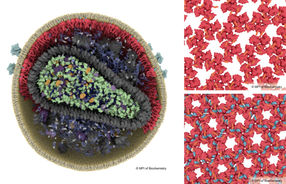Lipids with potential health benefits in herbal teas
The lipids in some herbal teas have been identified in detail for the first time, preparing the ground for investigating their contribution to the health benefits of the teas
Herbal teas are enjoyed worldwide, not only for their taste and refreshment but also for a wide range of reputed health benefits. But the potential significance of a category of compounds called lipids in the teas has been relatively unexplored. Researchers at Hokkaido University, led by Associate Professor Siddabasave Gowda and Professor Shu-Ping Hui of the Faculty of Health Sciences, have now identified 341 different molecular species from five categories of lipids in samples of four types of herbal tea. They published their results in the journal Food Chemistry.
Lipids are a diverse collection of natural substances that share the property of being insoluble in water. They include all of the fats and oils that are common constituents of many foods, but they have generally not been examined as significant components of teas.
The Hokkaido team selected four teas for their initial analysis: dokudami (Houttuynia cordata, fish mint), kumazasa (Sasa veitchii), sugina (Equisetum arvense, common horsetail) and yomogi (Artemisia princeps, Japanese mugwort).
“These herbs are native to Japan and have been widely consumed as tea from ancient times due to their medicinal properties,” says Gowda. The medicinal benefits attributed to these and other herbal teas include antioxidant, antiglycation, anti-inflammatory, antibacterial, antiviral, anti-allergic, anticarcinogenic, antithrombotic, vasodilatory, antimutagenic, and anti-aging effects.
The lipids in the teas were separated and identified by combining two modern analytical techniques called high-performance liquid chromatography and linear ion trap-Orbitrap mass spectrometry.
The analysis revealed significant variations in the lipids in the four types of tea, with each type containing some known bioactive lipids. These included a distinct category of lipids called short-chain fatty acid esters of hydroxy fatty acids (SFAHFAs), some of which had never previously been found in plants. SFAHFAs detected in tea could be a novel source of short-chain fatty acids, which are essential metabolites for maintaining gut health.
“The discovery of these novel SFAHFAs opens new avenues for research,” says Hui, adding that the lipid concentrations found in the teas are at levels that could be expected to have significant nutritional and medical effects in consumers.
The lipids discovered also included α-linolenic acid, already known for its anti-inflammatory properties, and arachidonic acid which has been associated with a variety of health benefits. These two compounds are examples of a range of poly-unsaturated fatty acids found in the teas, a category of lipids that are well-known for their nutritional benefits.
“Our initial study paves the way for further exploration of the role of lipids in herbal teas and their broad implications for human health and nutrition,” Gowda concludes. “We now want to expand our research to characterize the lipids in more than 40 types of herbal tea in the near future.”
Original publication

Get the analytics and lab tech industry in your inbox
By submitting this form you agree that LUMITOS AG will send you the newsletter(s) selected above by email. Your data will not be passed on to third parties. Your data will be stored and processed in accordance with our data protection regulations. LUMITOS may contact you by email for the purpose of advertising or market and opinion surveys. You can revoke your consent at any time without giving reasons to LUMITOS AG, Ernst-Augustin-Str. 2, 12489 Berlin, Germany or by e-mail at revoke@lumitos.com with effect for the future. In addition, each email contains a link to unsubscribe from the corresponding newsletter.
More news from our other portals
See the theme worlds for related content
Topic world HPLC
HPLC is a key technology in modern analytical chemistry. It enables the separation, identification and quantification of components in complex mixtures with high precision and efficiency. Whether in the analysis of active pharmaceutical ingredients, the quality control of foodstuffs or the examination of biological samples - HPLC is often the method of choice for demanding separation tasks.

Topic world HPLC
HPLC is a key technology in modern analytical chemistry. It enables the separation, identification and quantification of components in complex mixtures with high precision and efficiency. Whether in the analysis of active pharmaceutical ingredients, the quality control of foodstuffs or the examination of biological samples - HPLC is often the method of choice for demanding separation tasks.
Topic World Mass Spectrometry
Mass spectrometry enables us to detect and identify molecules and reveal their structure. Whether in chemistry, biochemistry or forensics - mass spectrometry opens up unexpected insights into the composition of our world. Immerse yourself in the fascinating world of mass spectrometry!

Topic World Mass Spectrometry
Mass spectrometry enables us to detect and identify molecules and reveal their structure. Whether in chemistry, biochemistry or forensics - mass spectrometry opens up unexpected insights into the composition of our world. Immerse yourself in the fascinating world of mass spectrometry!




























































